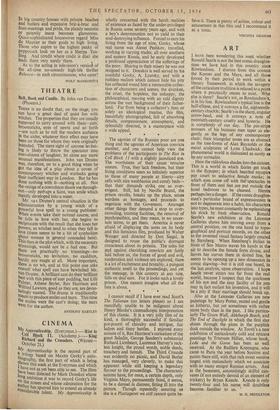CINEMA
My Apprenticeship. (Everyman.)—Riot in Cell Block 11. (Academy.)-7--- King Richard and the Crusaders. (Warner— October 21.) My Apprenticeship is the second part of Et trilogy based on Maxim Gorky's auto- biography, the first part of which is being shown this week at the Everyman and which I have not as yet been able to see. The films have been directed by Mark Donskoi whose 'Ong ambition it was to record Gorky's life On the screen and whose admiration for the author has spurred him to extend an already considerable talent. My Apprenticeship is
wholly concerned with the harsh realities of existence as faced by the under-privileged in Russia some seventy years ago, and with a boy's determination not to yield to their soul-destroying influence. Forced to earn his living from the age of nine, Gorky, whose real name was Alexei Peshkov, travelled, working in varying trades, all over southern and eastern Russia, and he early developed a profound appreciation of the sufferings of the poor. Sharing in their misery he was not resigned to it. Donskoi is well served by his youthful Gorky, A. Lyarsky, and with a ruthless realism which cannot hide his pity has collected round him a memorable collec- tion of characters and scenes, the drunken, the cruel, the hopeless, the unhappy, the philosophical, moving with an odd dignity across the vast background of their father- land. Far from being a collector's item or solely an ideological treatise, this film, beautifully photographed, full of absorbing details, compassionate, atmospheric, and splendidly directed, is a masterpiece with a wide appeal. • •
The agonies of the Russian poor are one thing and the agonies of American convicts another, and one cannot help view the problems of the participants in The Riot in Cell Block 11 with a slightly jaundiced eye. The worthiness of their cause remains unsure. True, they lack freedom, but their living conditions seem so infinitely superior to those of many people at liberty—airy cells with nice washbasins and comfy beds— that their demands strike one as over- exigent. Still, led by Neville Brand, the prison revolts, breaks up the place, seizes wardens as hostages, and proceeds to negotiate with the Governors. Amongst other things they demand a stop to over- crowding, training facilities, the removal of psychopathics, and they mean, in no uncer- tain terms, to get them. America is never afraid of displaying the sores on its body and this ferocious film, produced by Walter Wanger and directed by Don Siegal, is designed to rouse the public's dormant conscience about its prisons. The sides for and against cherishing convicts are fairly laid before us, the forces of good and evil, moderation and Violence are explored, there is a lot of excitement and brutality, a pungent authentic smell to the proceedings, and yet the message, in this country at any rate, falls on deaf ears. For it looks such a lovely prison. One cannot imagine what all the fuss is about. • • • I cannot recall if I have ever read Scott's The Talisman (no letters please) so I am mercifully unable to be indignant about Henry Blanke's cinemaScopic interpretation of this classic. It is a very jolly film of its kind, a thoroughly successful if familiar pot-pourri of chivalry and intrigue, fair ladyes and tinny battles. I enjoyed every minute of it, Rex Harrison's caricature of the great Saladin, George Sanders's substantial Richard Lionheart, Laurence Harvey's reck- less knight, the proud words, noble deeds, treachery and tumult. The Third Crusade was evidently no picnic, and David Butler has managed, very cleverly, to make this apparent while still keeping a legendary flavour to the proceedings. The characteri- sations have, for once, a certain depth, only Virginia Mayo, permanently fated, it seems, to be a damsel in distress, fitting ill into the picture. Though repeatedly assuring us she is a Plantagenet we still cannot quite be-
lieve it. There is plenty of action, colour and amusement in this tilm and I recommend it as a tonic.
VIRGINIA GRAHAM


































 Previous page
Previous page